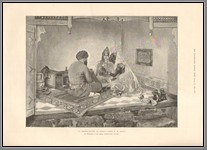Algeria, Tunisia
Collection of 8 illustrations from Le Petit Journal and Le Petit Parisien concerning the French pacification of Algeria, 1891-1911. EH B
Price: $320.00
Note: On the pretext of a slight to their consul, the French invaded Algiers in 1830, thus supplanting the Ottoman Empire; however, intense resistance from such personalities as Emir Abdelkader, Ahmed Bey and Fatma N’Soumer made for a slow conquest of Algeria, not technically completed until the early 1900’s when the last Tuareg were conquered. TN 028
TN 028 TN 028
TN 028
Meanwhile, however, the French suppressed slavery and made Algeria an integral part of France, a status that would end only with the collapse of the Fourth Republic. Tens of thousands of settlers from France, Italy, Spain, and Malta moved in to farm the Algerian coastal plain and occupy the most prized parts of Algeria's cities, benefiting from the French government's confiscation of communally held land. People of European descent in Algeria (the so-called pieds-noirs), as well as the native Algerian Jews, were full French citizens starting from the end of the 19th century; by contrast, the vast majority of Muslim Algerians (even veterans of the French army) remained outside of French law, possessing neither French citizenship nor the right to vote. Algeria's social fabric was stretched to breaking point during this period: literacy dropped massively, while land confiscation uprooted much of the population.
 TN 028
TN 028 TN 028Abdelkader (1808-1883) was an Algerian military leader who fought the French and became a national hero. By 1832, he was made an amir and with the loyalty of a number of tribes began a rebellion against the French. He was effective at using guerilla warfare and for a decade, up until 1842, he had many victories. He often signed tactical truces with the French, but these did not last. His power base was in the western part of Algeria, where he was successful in uniting the tribes against the French. He was noted for his chivalry; once he released his French captives simply because he had insufficient food to feed them. However, he was eventually forced to surrender. The French armies brutally suppressed the native population and practiced a scorched-earth policy. His failure to get support from eastern tribes, apart from the Berbers of western Kabylie also contributed to the quelling of the rebellion. On December 21, 1847, after being denied refuge in Morocco (strangely parallelling Jugurtha’s career two thousand years earlier), Abdelkader was forced to surrender.
TN 028Abdelkader (1808-1883) was an Algerian military leader who fought the French and became a national hero. By 1832, he was made an amir and with the loyalty of a number of tribes began a rebellion against the French. He was effective at using guerilla warfare and for a decade, up until 1842, he had many victories. He often signed tactical truces with the French, but these did not last. His power base was in the western part of Algeria, where he was successful in uniting the tribes against the French. He was noted for his chivalry; once he released his French captives simply because he had insufficient food to feed them. However, he was eventually forced to surrender. The French armies brutally suppressed the native population and practiced a scorched-earth policy. His failure to get support from eastern tribes, apart from the Berbers of western Kabylie also contributed to the quelling of the rebellion. On December 21, 1847, after being denied refuge in Morocco (strangely parallelling Jugurtha’s career two thousand years earlier), Abdelkader was forced to surrender.
 TN 028
TN 028 TN 028Ahmed Bey or Hadj Ahmed Bey (1784-1850) was the last Bey of Constantine. He led the Algerian resistance to the French occupation in the eastern part of Algeria from 1836 to 1848.
TN 028Ahmed Bey or Hadj Ahmed Bey (1784-1850) was the last Bey of Constantine. He led the Algerian resistance to the French occupation in the eastern part of Algeria from 1836 to 1848.
Lalla Fatma n'Soumer (1830-1863) was an Algerian woman who led western Kabylie in battle against French colonizers. She was born in Ouerja, near Ain el Hammam, and led the fight against General Randon's invasion, together with her brother Si Tahar. She was called the Joan of Arc of Kabylie by her French adversaries.

















